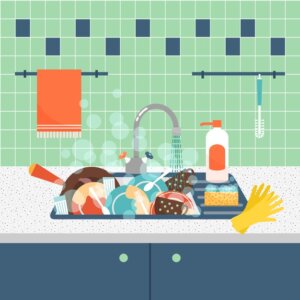
Being Flushable Is a Misnomer
Plumbing professionals agree that being flushable isn’t a thing, so even if those wipes say you can flush them, don’t as they can easily cause blockages by getting lodged with the trap of today’s water-efficient low-flow toilets. The same goes for cotton balls and swabs, along with paper towels and even that supposedly flushable cat litter.
Don’t Clog Your Pipes With These
Our DomiDocs New Homeowner Guide is chock-full of tips and tricks for making your journey as a homeowner the best it can be. Here’s an excerpt from our guide of items you should avoid putting down your drains and/or garbage disposal:
- coffee grounds (they clump and build up; use them as garden fertilizer instead)
- beans, eggshells, pasta, and rice (will grind down but becomes a pasty clog; eggshells are a great addition to your compost)
- bones (can break apart but could stay in your drain forever)
- grease (pour it into a glass jar, let cool, and then dispose of it in your garbage)
- leftover bread dough and/or flour (creates a thick paste)
- marshmallow (gums up)
- non-food items like cigarette butts, elastics, hair and twist ties, as well as:
- medication (expired, unwanted, or old medication needs to be disposed of properly at your nearest pharmacy)
- paint (all paint needs to be taken to a hazardous waste facility for proper disposal)
- pesky produce stickers
- pits from peaches or avocados, or any types of seeds including unpopped popcorn kernels
- shells from crab, clam, oyster, and lobster
- vegetables:
- fibrous vegetables such as asparagus, banana peels, celery, corn husks, edamame pods, kale, lettuce, onion skins, potato, and rhubarb
- hard vegetables such as artichokes, bell pepper stems, carrots, corn cobs, and melon rinds
The End Game
Where do things end up after you dump them down the drain? If the waste treatment plant in your city can’t properly filter everything that comes through their facility, chemicals can reach ocean waters where they can negatively impact marine life. This applies to:
- household cleaners (it’s best to seek out water-soluble all-natural products)
- leftover paint (releases fumes, is flammable, and will stick to your plumbing)
- microplastics or microbeads are commonly found in health and scrubbing-type beauty products ( there isn’t really any way to prevent them from going down the drain other than by not using them)
How to Naturally Clear Your Drains
Experts suggest trying a 4-step process for cleaning your drains before calling in a professional. If you’re not sure who to call, consult our DomiDocs list of trusted nationwide contractors and check out: Tips Your Plumber Won’t Tell You.
- Pour a kettle of boiling water down your drain.
- Add a cup of baking soda followed by a cup of water and a cup of vinegar.
- Let it sit for approximately 10 minutes.
- Pour a second kettle of water down your drain to clear out the pipes.
DomiDocs is here to make the most out of home-ownership. Our user-friendly digital home management system is designed to keep you organized and ahead of the curve, all while saving money, time, and reducing expenses. DomiDocs is easy to use and you can register right now for free!
Author – Connie Motz
